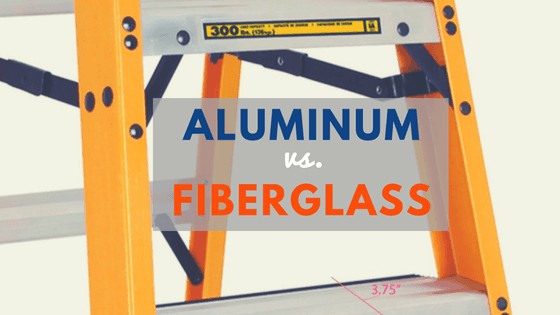A ladder is a ladder is a ladder, right?
Hmm. Ask the guy who compound-fractured his femur when his cheaply-made extension ladder folded underneath him from 12’ high.
Truth is, there actually isn’t a whole lot to distinguish between ladders when comparing styles, materials, and manufacturers, but there are a definitely a few things you’ll want to consider before you think about making a purchase.
As a golden, general rule of thumb, do yourself a favor and keep this in mind: don’t skimp on your ladder purchase. Splash the cash, invest in a quality one, and keep it for the rest of your life. Trust us, it’s a one-time buy that’s not worth sacrificing quality to save a few bucks.
Quick Picks: Our Best Rated Ladders
[sc name="Aluminum vs Fiberglass Ladder"]
In this article, we’ll discuss key things to consider when trying to choose the right ladder for your needs; namely, we’ll discuss and compare aluminum vs. fiberglass ladders, talk about the advantages/disadvantages of each, in hopes of helping you make the safest and most appropriate purchase for your needs.
Differences between aluminum and fiberglass ladders
Ok, here’s the general low-down on aluminum vs. fiberglass ladders:
Fiberglass are generally stronger/sturdier/heavier/more rigid than aluminum ladders. However, because of their weight and rigidity, they’re typically only used as step ladders, not as full-length extension ladders.
Aluminum ladders are lighter, easier to carry/transport, and are more commonly used as extension ladders.
Fiberglass ladders are generally more expensive than aluminum.
Overall, fiberglass ladders are the better, safer choice not only because of their rigidity and sturdiness, but because they’re non-conductive - you don’t have to worry about electrocuting yourself through your ladder if you’re working around hot/live wires.
Step vs. extension ladders
Like we said, because of their weight, fiberglass extension ladders are pretty tough to handle if you’ll be working solo - aluminum is typically the more common option for extension ladders.
That being said, a fiberglass extension ladder is by no means a bad thing; they’re still preferable over their aluminum counterparts, but unless you’ve got a professional workspace to store/haul it, and are ready to drop a pretty significant penny, the more economical choice is always going to be aluminum. Bear in mind our golden rule, though, and don’t take any risks with weight limits: if you’re a heftier guy/gal, absolutely do not take any chances on pushing the load capacity just to try and keep a few extra dollars in the piggy bank.
For general purpose step ladders, fiberglass is the go-to choice. They’re naturally going to be heavier than aluminum, but the sturdiness and all-around safety they offer is well worth the sacrifice in convenience.
Price Comparison
In general, fiberglass ladders are going to be a bit more expensive than aluminum.
Now, don’t let our praise towards fiberglass ladders give the impression that aluminum is useless, or bad in any way. A good quality aluminum ladder will suit just fine, as long as you abide by the weight limit, and don’t leave it sitting out in the rain for years on end.
Your father probably had a good aluminum ladder stashed in the garage your whole childhood, as did his father, and so on and so forth. The advantages of fiberglass are really for those who are consistently working around live wire, or always running into problems finding an economical aluminum ladder that suits their weight range.
For reference, expect a super good quality 8ft fiberglass step ladder to set you back easily be double the price of an aluminum ladder
Quality of material
Obviously, both aluminum and fiberglass are superb materials that provie a good combination of strength, weight, durability, and economy (price).
You’ll hear plenty of folks swear that fiberglass is prone to cracking or breaking, and vice-versa that aluminum is prone to bending, swaying, and folding. But let’s get one thing clear; if you purchase a quality ladder and respect the weight capacities, you’ll be just fine.
Also, the condition of your ladder will naturally depend on how you care for it: toss it carelessly into and out of your pickup truck, throw it around the garage, and yeah, it very well may develop cracks/stress areas. On the other hand, use some common sense, heed the weight limit, and it’ll surely last you a lifetime.
Safety
Like we already mentioned, fiberglass ladders take the award for the most safe between the two, hands-down.
Their combination of heat resistance, non-electrical conductivity, and supreme sturdiness/rigidity make them the obvious winner if safety is your primary concern (which it should be).
So what’s the advantage of aluminum?
The two main advantages of aluminum ladders over fiberglass are weight and price.
They’re much easier to carry/maneuver around, and they’re also generally a good deal less expensive. Not to mention, you’re much more likely to find a wider range of selection of aluminum ladders than fiberglass at your local hardware store.
All good reasons why aluminum tends to be the more prominent/common choice in homeowner’s garages across the country.
Our Top Choices For Each
This list is a compilation of various good quality ladders that we’ve had experience with - not the most expensive or absurdly-priced pieces in the world, just good, solid, durable tools that get the job done.
[sc name="Aluminum vs Fiberglass Ladder"]
Bottom Line
To summarize, we’ll reiterate our golden rule(s) of thumb that we mentioned in the intro: don’t skimp on quality when buying a ladder, and abide by the weight rating.
Either an aluminum or fiberglass ladder of good quality will serve you well, but if you’re skeptical/nervous about stability, and/or find yourself working often around live electrical wires, then we highly recommend going fiberglass.



I dropped by 28′ fiberglass extension ladder. Now it’s bent. Can it be repaired?
Guys – I don’t think your “price grabber” is working.
You show your top choice DeWalt DXL3010 10 ft. ladder priced “From $78.69”. Clicking on your Amazon link show its actual price as “WAY AWAY FROM” that! In fact, over three times that price – at $256.97.
I didn’t check prices on any of the other items, but this one was CRAZY, CRAZY wrong.
Paul